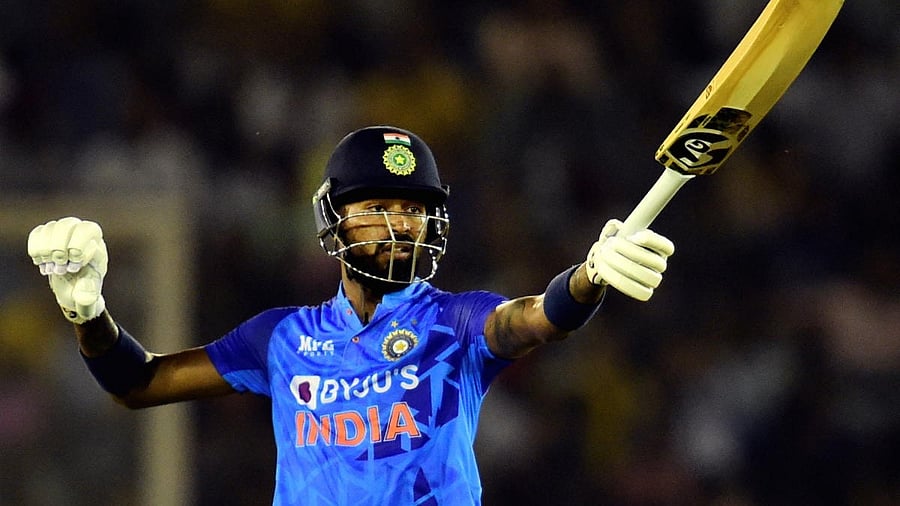
Indian batsman Hardik Pandya.
Credit: PTI File Photo
On March 9 at the 2015 World Cup in Adelaide, England were unceremoniously dumped out of the quadrennial 50-over event following a 15-run loss to Bangladesh.
On November 10 at the 2022 T20 World Cup, also in Adelaide, England humiliated India with a 10-wicket thrashing in the semifinal.
March 9 of 2015 became a seminal moment in revolutionising England's white-ball cricket. They discarded their old-school approach and left out players who wouldn't fit into their new brand of aggressive cricket. The changes they adopted without a shred of compromise saw them win the 50-over World Cup for the first time in the tournament's 44-year history in 2019. Three years later, they added a second T20 World Cup title in Australia, beating Pakistan in the final.
November 10 ought to have been India's own watershed moment - one that would herald a tectonic shift in the way they played their white-ball cricket, particularly the T20 format. While there has been a drastic change in personnel in the shortest format with some seniors making way for young guns following the T20 World Cup debacle in Australia last year, there hasn't been a radical switch in their method yet.
The openers appear to be in perpetual confusion - whether to go on an all-out attack or play the conditions and situations. The middle-order seems to bat with the fear of failure, oscillating between a sudden burst of offence and a surprising period of lull. The three matches so far against West Indies best illustrate their predicament.
In the first two games, the batters were diffident - both while chasing a target in the first tie and while setting a target in the second, losing both of them. In a must-win situation to stay alive in the five-match T20I series, India brought their A game on Tuesday en route a comprehensive seven-wicket win. Despite losing the openers early in the chase, Suryakumar Yadav never took the foot off accelerator, with Tilak Varma playing perfect foil.
One can't put India's aggressive method on Tuesday down to conditions, because the pitches for all three matches have been on the slower side with marginal differences. The difference, though, was India's intent, which only surfaces intermittently but not frequently enough to make them seize the big moments. From where and why that inconsistency comes isn't clear.
Is it the lack of batting depth which is basically the result of a lack of all-rounders? If India play an extra batter, their bowling will be thin, which they aren't comfortable with. So, they are trusting their seven batters, including two all-rounders in Hardik Pandya and Axar Patel, to do the job for them.
"As a group, we have decided to bat with seven batters and we have to take responsibility, like it happened today. If the batters score runs, then you don't need someone at number eight," said skipper Hardik Pandya after India's win.
The operative word here is "if". If the (top-order) batters fall early, as happened during the first two T20s, the middle-order retreats into a shell, the lack of extra batting cushion preventing them from playing without the concern of exposing the long tail early. To offset this imbalance, India need more all-rounders. The problem is that they don't have many to choose from. It's shocking that despite having the best T20 franchise league in the world for 15 years now, India haven't been able to unearth a set of quality all-rounders.
"That's what happens when you don't have multi-dimensional cricketers," says former India opener WV Raman, commenting on batters' inconsistent approach. "We also have to see these players are very young and we can't equate IPL with international cricket. In India, the nature of the pitches is almost similar throughout the country, and suddenly when you encounter different tracks while playing different formats in quick succession, it becomes challenging. It doesn't allow you to play the game you would like to.
"Also the pressure to perform in international cricket is much more than in IPL. There are too many contenders fighting for too few slots in the Indian team."
All-rounders are crucial in any format for the kind of balance and depth they provide in both bowling and batting. But they become even more crucial in T20 cricket. Even if it makes for a random analysis, in four of the eight T20 World Cups so far, all-rounders have been both Player of the Tournament and the Final. In two events, they have been Players of the Final. Only on two other occasions have specialist batsmen won both honours. At the last T20 World Cup, eventual champions England had five top-quality all-rounders while runners-up Pakistan boasted four.
India did try the likes of Vijay Shankar, Shivam Dube, Venkatesh Iyer and Krunal Pandya, but none of them measured up to the standards expected of them. Now, apart from Hardik, they are left with only Ravindra Jadeja, Axar Patel and Shardul Thakur.
Between Jadeja and Axar, only one can play while Shardul, despite some impressive shows, doesn't inspire the same confidence as a Jadeja or a Hardik. Unless India mine a line-up of all-rounders, their desire to play fearless cricket will remain just that.
Even if India can't manage an all-rounder in the class of a Ben Stokes, they would do well with a couple of batters who can send down two-three overs like a Yuvraj Singh or a Sachin Tendulkar or bowlers who can manufacture big hits a la Harbhajan Singh.